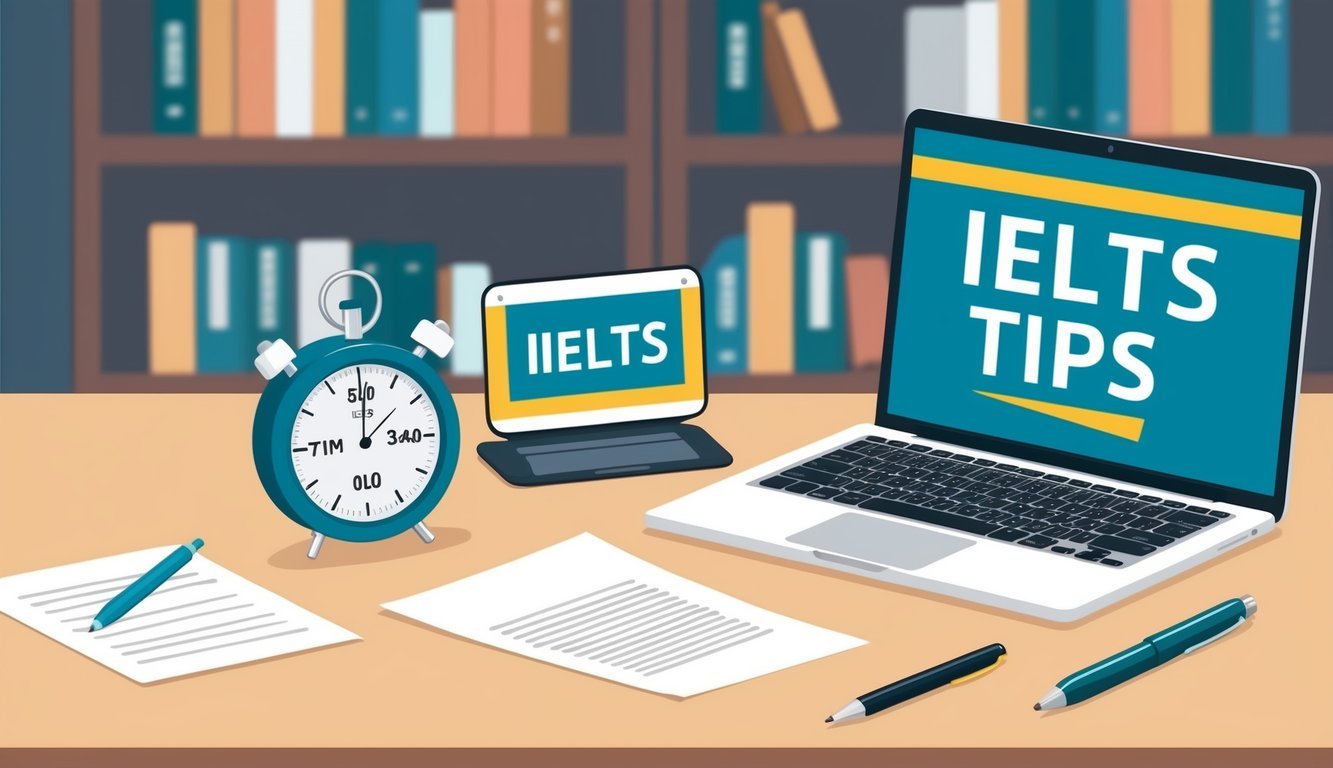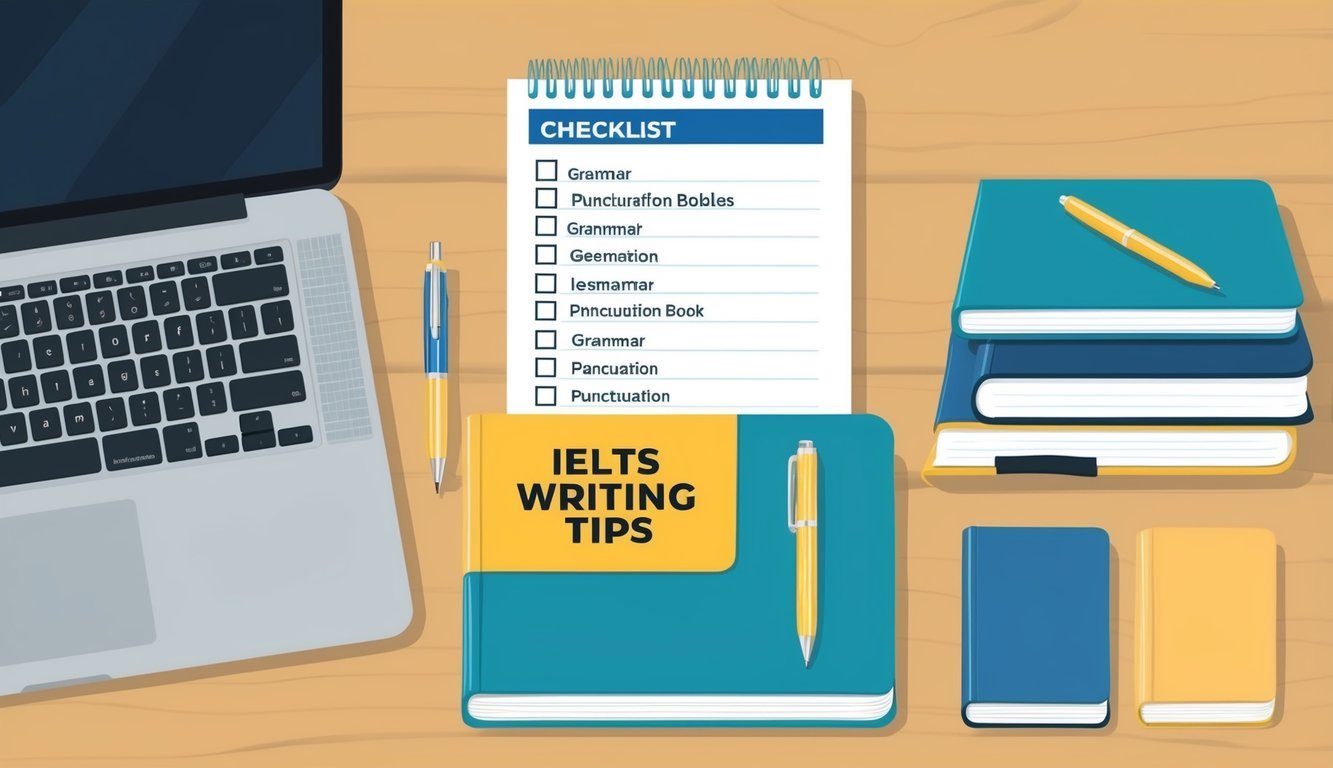Getting a good score on the IELTS writing section can be tough, but you can achieve it with the right strategies.
Many test takers aim for a Band 7 or higher, which opens up new opportunities for education and work. These seven tips will guide you on how to improve your writing and boost your score.

From understanding the test format to mastering your vocabulary, there are several important steps you can take to get ready.
Knowing what the examiners look for can help you focus your preparation and make your effort count.
With some practice and the right techniques, you can reach your target band score and feel confident on test day.
1) Understand the Task
Before you start writing, take a moment to really understand what the task is asking.
Read the prompt carefully.
Make sure you know whether you need to describe, argue, or discuss a topic.
Identify the key parts of the task.
Look for keywords that tell you what to focus on.
This helps you stay on track and answer all parts.
Spend a few minutes planning your response.
Jot down your main ideas and examples.
This planning step can really boost your clarity and coherence.
Remember, a clear response that directly addresses the task is what examiners want.
Don’t just write everything you know about a topic.
Stay focused on what’s asked.
Finally, keep in mind that demonstrating clear understanding is one way to score well in the IELTS writing test.
Take your time with this step, and it will pay off in your final score.
2) Plan Before Writing
Before you start writing your IELTS essay, take a few minutes to plan.
It really does make a difference.
Spend about 5-10 minutes to think through the task.
Read the question carefully and make sure you understand what is being asked.
Next, brainstorm your ideas.
Jot down key points you want to include.
Organizing your thoughts helps you stay focused while writing.
Create a clear outline.
This will guide you through your essay and ensure that your points flow logically.
A structured plan makes it easier to write a coherent essay.
Having a plan also saves you time.
You won’t get stuck wondering what to say next.
Instead, you can focus on expressing your ideas clearly.
Always remember, a good plan lays the foundation for a high-scoring essay.
So, take the time to map out your thoughts before diving in.
Use a Variety of Sentence Structures
Using different sentence structures can really boost your IELTS Writing score.
It shows you can use the English language flexibly.
This is important for impressing the examiners.
Try mixing up simple, compound, and complex sentences.
A simple sentence gets straight to the point, while a compound sentence combines two ideas.
Complex sentences add depth by including additional information.
For example, instead of saying, “The city has many parks,” you can say, “The city, which is known for its greenery, has many parks.” This change makes your writing more interesting.
You can also add appositives to provide extra details.
For instance, “The IELTS exam, a test required for many universities, can be challenging.” This adds context without making things too complicated.
Don’t forget participle phrases either.
They can help you make your sentences more concise.
Instead of “When I walked to the store, I saw my friend,” you could say, “Seeing my friend while walking to the store made my day.”
Practicing these structures can really enhance your writing.
You’ll feel more confident and could see a higher band score.
4) Focus on Coherence and Cohesion
Coherence and cohesion are key for a high score in IELTS writing.
Coherence means your ideas flow logically.
Make sure each idea connects clearly to the next.
Use clear topic sentences to introduce your paragraphs.
This helps the reader know what to expect.
Cohesion is about how your sentences link together.
Use linking words and phrases to connect your thoughts.
Words like “first,” “next,” and “however” can guide your reader through your essay.
When you plan your essay, think about how you will connect your points.
A good outline can help keep your writing organized.
After writing, review your work to check for smooth transitions between ideas.
This is where many students struggle.
Practice writing essays within a set time.
It helps you get used to thinking quickly while maintaining coherence and cohesion.
You can find tips and practices to improve these skills and boost your band score.
For more details, check out coherence and cohesion techniques.
5) Develop Your Vocabulary
Building a strong vocabulary is key for scoring high in IELTS Writing.
When you use varied and precise words, your writing sounds more impressive.
Start by learning new words every day.
Focus on words related to common IELTS topics like education, health, and technology.
Use flashcards or apps to help you memorize them.
Practice using these words in sentences.
This not only helps you remember them but also shows you how to use them correctly.
Don’t forget to explore synonyms.
Using different words for the same idea can make your writing more interesting.
For example, instead of always saying “important,” you can switch it up with “crucial” or “significant.”
Additionally, reading widely can help expand your vocabulary.
Books, articles, and essays expose you to new words in context.
Finally, don’t be afraid to write! Incorporate your new vocabulary into practice essays.
The more you use new words, the more confident you’ll feel during the exam.
6) Practice Timed Writing Tasks

Practicing timed writing tasks is a great way to prepare for the IELTS exam.
It helps you get used to writing under pressure.
This is important since the test has strict time limits.
Start by setting a timer for the allotted time for each task.
For the IELTS Writing Task 1, you get 20 minutes, and for Task 2, it’s 40 minutes.
Focus on completing your essays within these time frames.
When you practice, pick different topics to write about.
This will help you become comfortable with a range of subjects.
Try to stick to the structure you plan to use in the actual test.
After writing, review your work.
Look for any grammar mistakes, awkward phrases, or areas where you can improve clarity.
This reflection can be just as valuable as writing itself.
The more you practice, the more confident you’ll feel during the actual exam.
It’s a crucial part of your preparation that can help boost your score.
So grab a stopwatch and start practicing!
7) Review Grammar and Punctuation

Checking your grammar and punctuation is key to getting a Band 7 or higher.
Even small mistakes can hurt your score.
Start with the basics.
Make sure your sentences are clear and properly structured.
Use a mix of simple and complex sentences to show your range.
Don’t forget about punctuation.
Commas and periods might seem small, but they help the reader understand your ideas.
Misplaced punctuation can change the meaning of a sentence.
Read your writing out loud.
This can help you catch errors and awkward phrases.
If something sounds off, take a closer look.
Practice makes perfect.
Use grammar exercises online to target your weak spots.
The more you practice, the more confident you’ll become in your writing.
Using these tips can help improve your overall writing quality.
Remember that precise grammar and punctuation boost clarity.
This is important for scoring well in the IELTS writing section.
Understanding the IELTS Writing Criteria

To score well in IELTS Writing, it’s crucial to know what the examiners are looking for.
The scoring focuses on four key areas: task response, coherence and cohesion, lexical resource, and grammatical range and accuracy.
Here’s a look at each one.
Task Response Explained
Task response is all about how well you address the essay prompt.
Make sure you read the question carefully and respond to every part.
Your essay should directly answer the question.
If it asks for your opinion, clearly state it.
Don’t forget to provide reasons and examples to support your views.
Strive for a balanced answer.
For instance, if the prompt has multiple parts, give each equal attention.
This shows you have a complete understanding of the topic.
Lastly, keep the word count in mind.
Writing at least 250 words is essential, but it’s also important to be relevant and concise.
Coherence and Cohesion
Coherence and cohesion focus on how well your ideas flow together.
You want your essay to be easy to follow, so organizing it logically is key.
Start with a clear introduction that outlines your main points.
Each paragraph should focus on a single idea, linked back to your main argument.
Always use topic sentences to guide the reader.
Transitions also play a major role.
Words like “firstly,” “however,” and “in addition” help connect your thoughts.
Avoid abrupt changes; instead, use linking words to guide your reader smoothly through your essay.
Lexical Resource
Lexical resource is about your choice of vocabulary.
To impress the examiner, aim to use a range of words without repeating them too often.
Using precise vocabulary can enhance your score.
Instead of saying “good,” try “beneficial” or “advantageous.” A varied vocabulary shows that you’re capable of expressing ideas clearly and accurately.
However, avoid using complex words just to appear sophisticated.
If you’re unsure of a word’s meaning, it’s best to stick to simpler options.
The goal is clarity over complexity.
Lastly, pay attention to spelling.
Mistakes can detract from your score, so proofread your work if time allows.
Grammatical Range and Accuracy
Grammatical range and accuracy are about using different sentence structures correctly.
Aim to include simple, compound, and complex sentences in your writing.
Using varied sentence types improves the flow of your writing.
It also helps you express more complex ideas.
Pay attention to punctuation and agreement.
Errors can disrupt clarity and affect your overall score.
Make sure your sentences are grammatically correct.
Common Mistakes to Avoid

When preparing for the IELTS Writing section, knowing common mistakes can greatly improve your score.
You want to focus on clarity and structure while avoiding traps that many test-takers fall into.
Overusing Complex Vocabulary
It might be tempting to use complex vocabulary to impress the examiner.
However, this can backfire.
If you don’t use the words correctly, it will hurt your score.
Instead of focusing solely on fancy words, aim for clarity.
Use words that you are comfortable with and know how to use properly.
Simplified language often communicates your ideas more effectively.
Remember to vary your vocabulary.
Repeating the same words can make your writing seem dull.
Try to mix it up without overcomplicating it.
Keep in mind that using idioms or overly complex phrases can confuse readers.
Stick to language that expresses your ideas clearly and accurately.
This will help you stay on track to achieve that Band 7+ score.
Ignoring Structure and Organization
Another frequent mistake is ignoring essay structure.
The IELTS Writing Task 2 requires you to write an essay with a clear introduction, body paragraphs, and a conclusion.
Your introduction should outline the main idea clearly, helping the reader know what to expect.
Each body paragraph should start with a topic sentence that introduces the point you will discuss.
Don’t forget about transitions.
Using words like “first,” “next,” and “finally” makes it easier for readers to follow your logic.
Each paragraph should connect logically to the next.
Finally, wrap up your essay with a concise conclusion.
Restate the main points and draw a clear conclusion based on your arguments.
Keeping your writing organized is key to impressing the examiner.
Frequently Asked Questions

You might have some questions about how to boost your IELTS writing score.
Here are some common queries and answers that can guide you in your preparation for achieving that Band 7 or higher.
How can I improve my IELTS Writing Task 1 to achieve a band 7 score?
To ace Writing Task 1, focus on understanding the task requirements.
Make sure to summarize the main trends and details accurately.
Use clear organization and a variety of sentence structures.
And don’t forget to practice interpreting different types of visuals like graphs and tables.
What are some effective strategies for scoring 7 or higher in IELTS Writing Task 2?
In Task 2, ensure you understand the question completely.
Plan your essay with a strong introduction, clear body paragraphs, and a solid conclusion.
Use linking words to improve coherence.
Also, diverse vocabulary will help score higher.
Could you share any samples of IELTS Writing Task 2 that scored band 7 or above?
Look for sample essays from trusted IELTS preparation websites.
They often provide high-scoring examples.
Analyze their structure, argumentation, and how they use language effectively.
This will give you a clearer picture of what works well.
What tips can help me boost my IELTS Writing score to band 7 in just 10 days?
In just 10 days, practice writing essays daily on various topics.
Focus on planning your essays before writing.
Reading good sample essays can also help you learn effective strategies.
Lastly, get feedback from teachers or peers to identify areas for improvement.
What practices should I adopt to consistently achieve a 7 band score in IELTS Writing?
Consistent practice is key.
Write essays regularly and seek feedback.
Read a variety of English texts to enhance your understanding of different writing styles.
Always review your work for coherence and clarity.
This will help you build a solid foundation.

